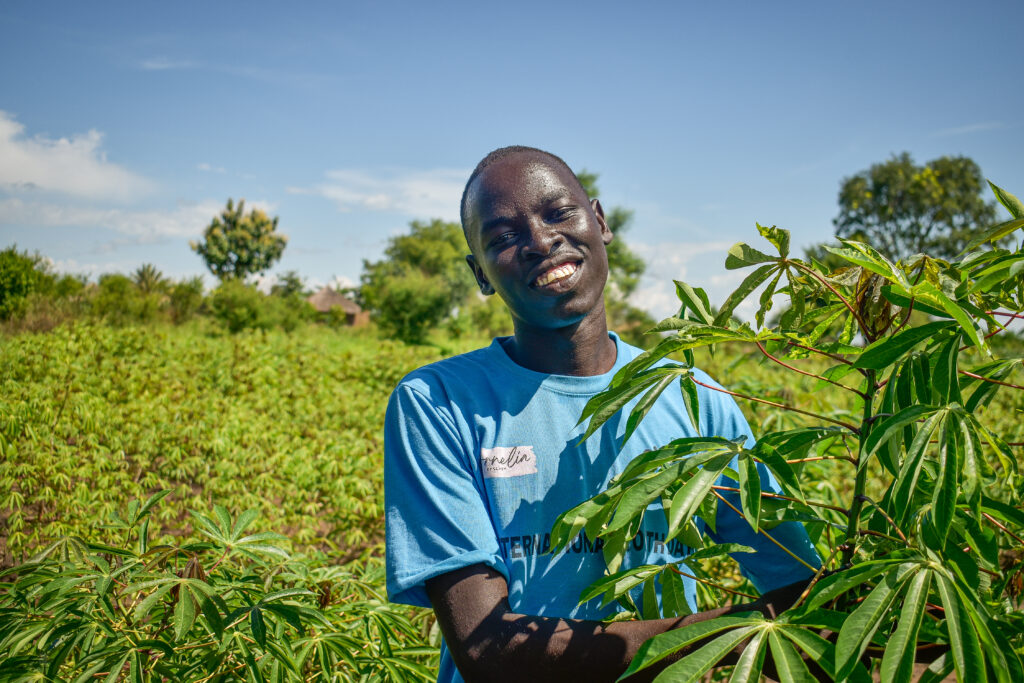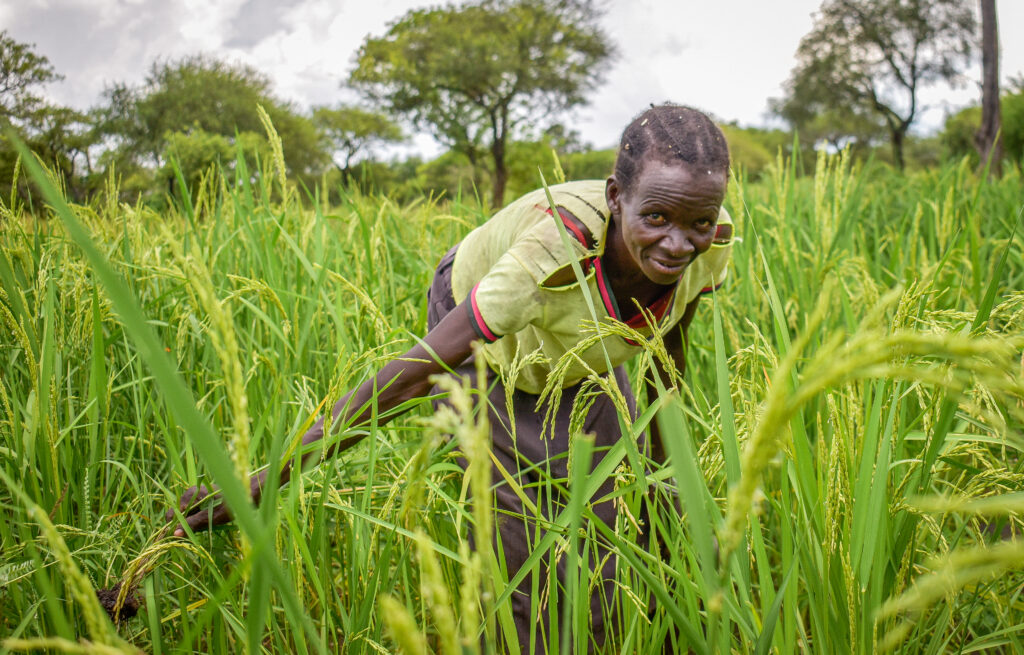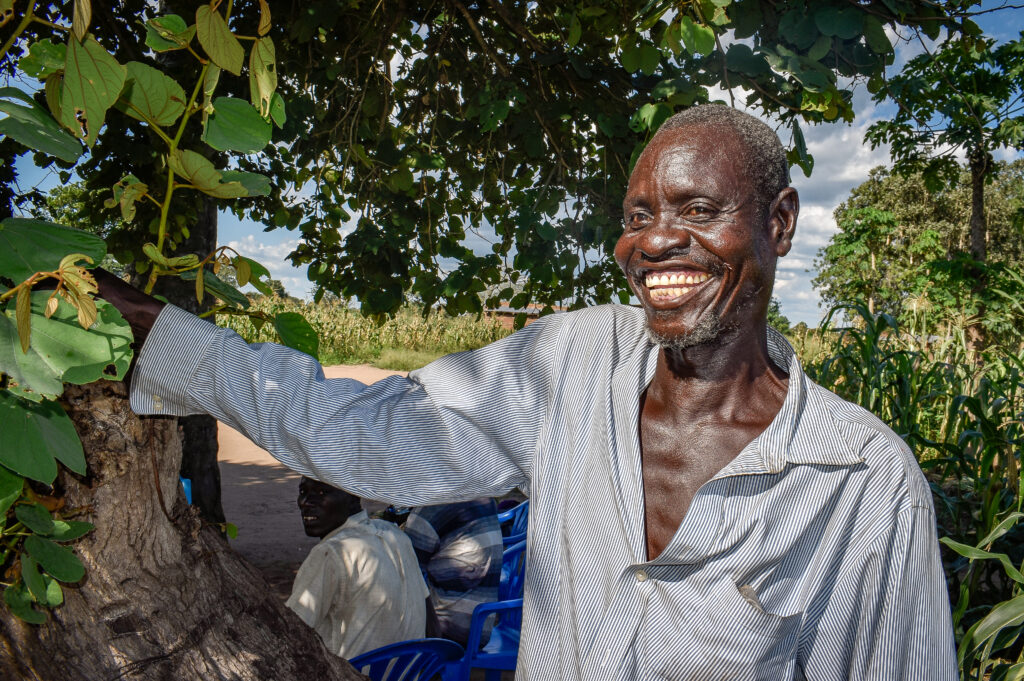Cordaid supports refugee communities in northern Uganda to build sustainable livelihoods by strengthening climate-resilient agriculture and inclusive market systems. The SAY Project (Skilling in Agripreneurship for Increased Youth Employment) recognises the potential of people of all genders and ages to revitalise local agriculture and boost food production.

Most refugees in the Bidibidi settlement in Uganda’s West Nile region fled the conflict in neighbouring South Sudan. Outbreaks of violence forced them out of their villages, leaving behind their businesses and livelihoods.
For the population in northern Uganda, the arrival of hundreds of thousands of refugees significantly impacted the social cohesion and local economy.
In recent years, climate change has challenged local food production, and funding cuts by the international community for aid and development have put the already struggling population in even more peril.
High-value crops
Cordaid’s SAY Project supports 4,000 youth from refugee and host communities in engaging in agribusiness, focusing on high-value crops.
‘Members of the farmer groups and cooperatives in Bidibidi have now become productive farmers who can feed their families but also contribute to the food supply chain’, says Henry Anguyo of the Refugee Welfare Council.
A crucial project component is the formation, registration, and empowerment of 200 village savings and loan associations.
‘By sharing our knowledge we have motivated several groups to diversify to more than one enterprise.’
The groups have received a grant through the project to boost their savings. Together, the farmers manage their finances to become more resilient against unexpected setbacks, such as prolonged droughts and failed harvests.
Doubling savings
Emmanuel Atiku is a refugee from Yangani and the secretary of one of the saving groups. He says these grants enable the group to double their savings.
‘Farming in the refugee settlements is an investment in sustainable solutions’, Emmanuel says. ‘It addresses immediate hunger but also yields long-term benefits. Our association has thirty members now. The extra income allows us to diversify our crops. We are planning to plant cassava and onions.’

The Business Support Facilitators (BSFs) are pivotal in the project. They offer mentorship and support to the farmer groups by coaching them in budgeting, business plan development and training the members on soil and water management, among many other activities.
More confident
According to Hassan Daniel, one of the eighteen BSFs in Bidibidi, youth participants have become much more confident in their agribusinesses. They can now seek advice and guidance whenever they need it. ‘By sharing our knowledge, we have motivated several groups to diversify into more than one enterprise, ‘ Hassan says. ‘They have now bought processing equipment to add value to their agricultural farm produce.’
‘About 80% to 90% of the population in the region depend on agriculture’, adds Rashid Kawawa, Production Officer at the District Government. ‘That’s why we must improve the value chains of lower-level agribusinesses and enable young people to become productive and contribute to the food security.’
Opportunities for women farmers
The Tru-Alo cooperative, led by fifteen female farmers, started in 2020 as a savings group and quickly broadened its ambition. Cordaid trained the members in climate-smart agriculture, enhancing their skills in soil improvement through compost-making, irrigation, ridge-making, mulching and water conservation techniques.
‘When I was fishing, I was always on my own. Now, I save money with the other members and I can access loans.’
According to participant Esther Ajonye, women generally engage in less lucrative agricultural activities, such as subsistence farming. ‘But now, we are united as women’, she says. ‘We share the money we earn to expand our acreage and diversify our crops. We focus on economic activities for women in the refugee community. Today, women talk about farming methods, which only men would do in the past. This also encourages youth to join us.’
Member Nema Ojila says making women’s voices heard is not the only achievement for the cooperative. ‘We now have money for our children’s school fees. We farm together and support each other. This makes the process manageable and less straining for one individual farmer. I feel so proud.’

From fishing to farming
Awinga, once a remote fishing community, has become a flourishing farming village thanks to the joint efforts of 38 cooperative members. It’s an inspiring success story of rural transformation driven by community engagement and agricultural innovation.
In 2018, Awinga’s cooperative registered under the SAY project and participated in comprehensive training. With Cordaid’s support, they received financial literacy education and learned how to operate a village savings and loan association.
‘Farming allows you to plan better, especially when you are part of a cooperative’, says Ismael Aliasi. 45-year-old Ismael has been fishing on the river Nile for 30 years. ‘I’ve become more disciplined. When I was fishing, I was always on my own. Now, I save money with the other members and can access loans.’

Working towards a sustainable future
As the Ariwa cooperative successfully wins over fishermen to start farming on land, the whole community benefits from the new food supply. This transformation epitomises the impact of the SAY project in Yumbe. It shows how sustainable agriculture can help entire communities move forward and leave concerns about food insecurity behind.